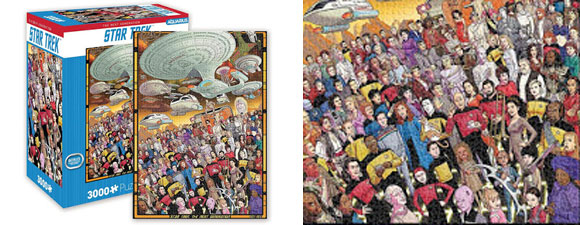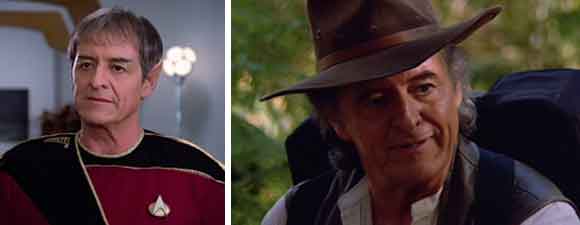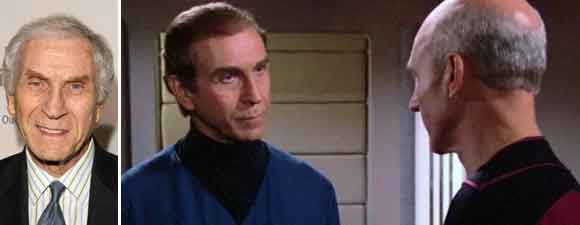Retro Review: The Quality of Life
8 min readA scientist develops potentially sentient machines with which Data feels kinship.
Plot Summary: LaForge is called away from a card game with crewmembers to assist at a new mining station. He arrives just before Dr. Farallon solves a dangerous power issue using an exocomp, a small robotic device she created to assist with engineering problems in the station’s core. He beams aboard the Enterprise with her so Farallon can report on the station’s progress, showing LaForge and Data that the exocomps were designed to create new pathways in their own memory – in essence, to learn. When one of the devices refuses to obey commands and burns out its own circuits to avoid being sent into a plasma conduit just before the plasma explodes, Data concludes that the exocomp has developed an instinct for self-preservation, which leads him to conclude that the exocomps are alive. This announcement is ridiculed by Farallon and apparently disproven by a subsequent test putting an exocomp in simulated danger from which it fails to extricate itself. But Data and Crusher realize that the device has determined that there is no real threat, which further suggests to data that the exocomps have developed reasoning. Picard and LaForge visit the station core, then become trapped due to a radiation leak. After Riker orders Farallon to transport the exocomps to the station to save the captain and engineer, Data takes the transporters offline, insisting that he will not sacrifice the exocomps to save his crewmates. Riker threatens to relieve him of duty but agrees see whether the exocomps will remain active after being reprogrammed, which Data believes would mean that they choose to accept the dangerous mission. The exocomps allow themselves to be transported, and repair the station in a way that none of the crew had known was possible. One of the exocomps sacrifices itself to allow the other two to be recovered. Later, Picard tells Data that he understands why the android felt it necessary to risk two human lives in order to protect the exocomps.
Analysis: Until I rewatched it for this review, “The Quality of Life” was one of very few episodes of Next Gen that I had only seen once. That’s because it’s one of very few episodes that I find not only poorly written but offensive. On a few occasions, Star Trek’s writers have achieved philosophical insights into the nature and meaning of life – one of the installments referenced by this one, “The Measure of a Man,” is an example of such a superlative episode, as is “The Offspring,” both reflections on what it means to be a living being with a soul. Both these stories focus on Data and teach by example; they ask more questions than they answer, and let viewers wrestle with their own beliefs about how spirituality and morality factor in. “The Quality of Life,” on the other hand, feels like a polemical lecture wrapped in an unbelievable, out-of-character storyline.
Unlike its writers, I don’t presume to know better than another when life begins or how sentience is determined. Star Trek is pretty vague to begin with on exactly what the responsibilities of higher life forms should be toward lower ones – we learned from The Voyage Home that we must save the whales not for their own sake but for the good of Earth, yet the majority of human Starfleet officers apparently still eat meat in the 24th century, so there are still distinctions being drawn between sentient and non-sentient beings and how the former are permitted to treat the latter. We’ve witnessed double standards in this franchise about the ethical treatment of helpful, harmless life forms as opposed to scary hive minds or menacing intelligences. Tribbles certainly qualify as life forms and seem about as intelligent as many fuzzy human pets, yet no one talks about protecting their rights as living beings when Scotty decides to dump them on the Klingons. If the exocomps count as sentient life because they will fight to protect themselves, shouldn’t Daystrom’s M-5 computer have counted as well, and Kirk et al have been charged with murder for driving this unique individual to suicide? Couldn’t the exocomps’ decision to sacrifice one individual to save two others reflect not nascent altruism, but the same sort of brutal disregard for individuality exhibited by the Borg?
As theoretical discussions, these are wonderful topics, but this episode isn’t much interested in theory. Data talks to Crusher for all of two minutes before becoming certain that he can define life, an issue with which scientists, philosophers and theologians have struggled for millennia. For all his wanting to be human, Data puts his own moral sense above that of his crewmates, having concluded that his is superior. Structurally, it has a lot in common with horror stories in which the manufactured individual (a la Frankenstein’s monster) inevitably becomes the villain. We see Data make the decision to throw away two fully realized human lives to protect a life form that can probably be rebuilt, since Farallon clearly has the technology – not that anyone seems interested in how she created these things. Certainly I’d understand if Data refused to let the exocomps be destroyed without anything at stake. But the implication is that all potentially sentient beings should be treated as equal at all times. How, then, does Data justify the use of weapons against Romulan battleships or trying to shoot Borg drones before they can shoot him? Since he concludes that new, unknown life must be nurtured even at the expense of existing life, I must assume that if Data were forced to choose between the life of a mother or the life of a fetus, he’d choose the fetus. There’s the additional implication that if Data were forced to choose between machine life and human life – oh, say, Lore – he’d stick with his own.
And he gets praised for this – for sticking with his convictions, which Picard finds very human. Picard doesn’t point out that sticking with one’s own personal convictions, putting one’s own values above those of others, doesn’t always mean a virtuous act like standing up for minorities against bigoted government laws or fighting to protect heretics being attacked by a religious mob. Sometimes, sticking with one’s convictions leads to things like scapegoating homosexuals or shooting gynecologists, in the name of protecting family values or saving the unborn. I’m trying to figure out if there’s a way to discuss my visceral loathing of “The Quality of Life” without noting the ways it touches upon the abortion debate, always a dangerous subject for television – so dangerous, in fact, that it tends to get presented in science fiction buried in metaphors and parallel situations. The words “life” and “choice” get thrown around a lot in this episode, in absolute terms where the “pro-life” position must be protected at all costs and “choice” is ultimately given not to the adults facing death but to the embryonic life forms.
Gender stereotypes get thrown around, too. I don’t think it can possibly be an accident that this particular story follows an extended opening sequence in which four crewmembers talk about how only men grow beards and only women wear makeup. (Really? There’s not one 24th century human male who wears eyeliner or nail polish?) The female scientist who developed the exocomps repeatedly apologizes for being so “touchy” – Data and LaForge make it clear that she’s barely mature enough to handle criticism, let alone to make decisions about the fate of the potential life forms she has conceived. When Daystrom and Soong created life from lifelessness, they celebrated themselves as near-gods, yet Farallon is written not as a would-be goddess nor even a mother, but a petty technician who doesn’t have the imagination to appreciate what she’s made. When she isn’t scoffing at the ridiculousness of the idea that something she built could have taken on a life of its own, she’s sulking that her particle fountain isn’t working (and its failure is epic – it kills one on her own team and nearly kills Picard and LaForge). She appears to have all the drawbacks of male super-geniuses we’ve seen on the show – arrogant, prideful, not a good team player, given to fits of despair over setbacks – without any of the breathtaking insights.
Then again, maybe that’s a good thing. Data’s actions here don’t seem heroic to me but childishly misguided at best, terrifying at worst. Beverly compares his questions to the ones Wesley asked as a child, but we never saw Wesley place his own childish values above the lives of other crewmembers. We’ve often seen Data value his own life less than that of humans, to offer to go into dangerous situations and have to be talked out of it by Picard and the others. This is an opposite extreme that’s hard to swallow. Data doesn’t want to feel unique and alone, so he concludes that the exocomps are like himself, then he concludes that exocomp life is as valuable as if not more valuable than humanoid life. And uses his abilities as the android science officer of the Enterprise to condemn Picard and LaForge to death accordingly. Only later, after his completely out of character speech about the need to protect all life equally, he offers to beam down in place of the exocomps, a solution he knows Riker can’t and won’t permit.
In a better-written episode, we’d have been spared the lecture and Data would simply have beamed himself into the deadly radiation to save Picard and LaForge while sparing the exocomps. Then the exocomps would have demonstrated their sentience by rescuing him, or better yet, the crew would have rescued Data and we’d have been left with unsettling uncertainty about whether or not the exocomps qualify as intelligent beings. We’d have had to come to our own conclusions, and make our own decisions about what sort of ethical behavior should follow from there. But as I said before, this episode isn’t interested in theory. It isn’t interested in asking us to think long and hard about the importance of our own lives versus other lives and about how we make ethical choices. It’s feeding us a message about potential life having absolute value, even more so than the lives of already-living people, and suggesting that there is always one appropriate course of action in a situation where such a conflict arises. That’s a moral that I just can’t swallow, and I really resent having Star Trek – a series created with traditional religion deliberately left out – trying to force it down my throat.






